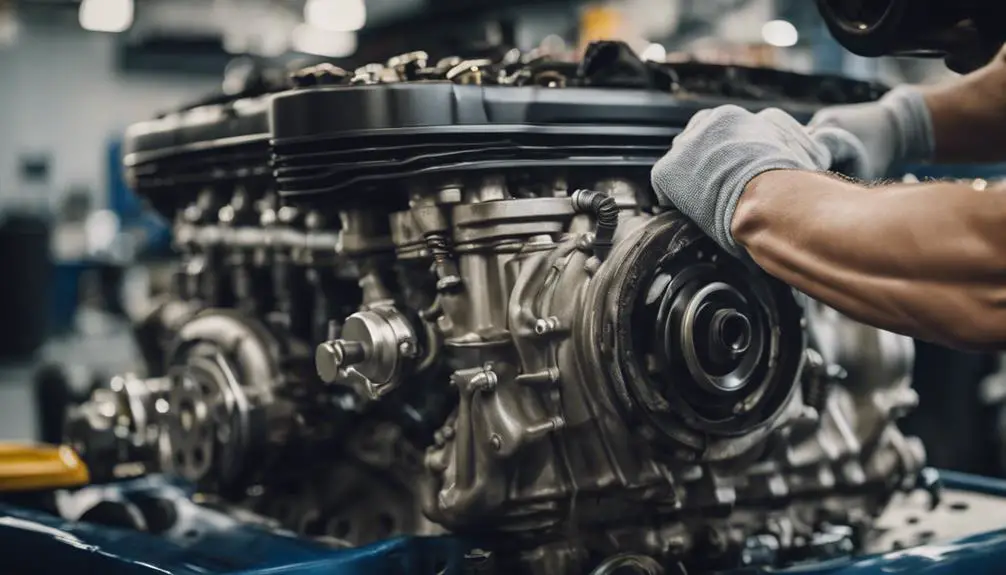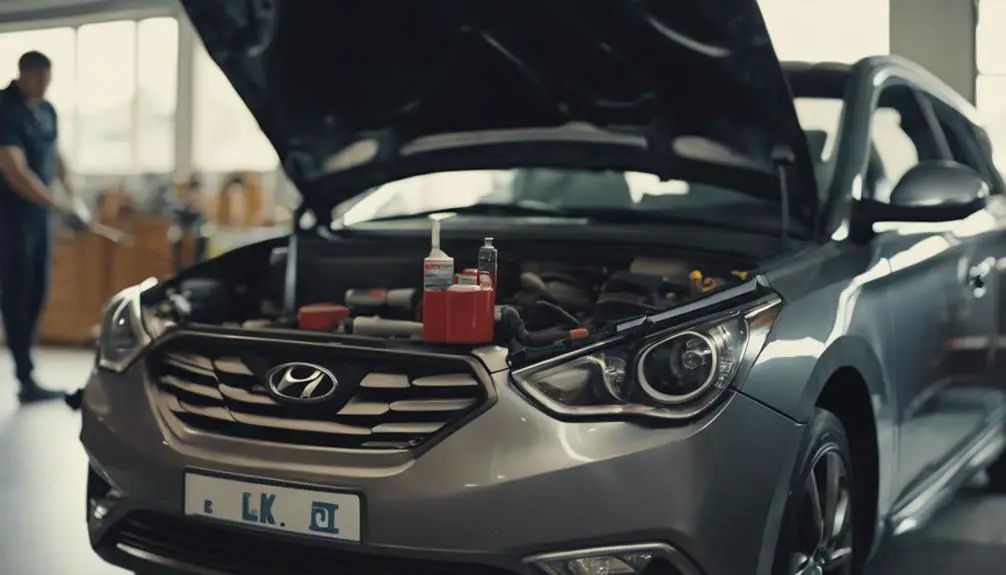Hyundai oil change frequency typically ranges between 7,500 and 10,000 miles, though this can vary based on the specific model and driving conditions.
Examples include the Hyundai Sonata, which requires oil changes every 7,500 miles, and the Hyundai Elantra, where the interval can extend up to 10,000 miles.
Factors influencing these intervals include driving habits, environment, and the type of oil used, necessitating adaptation to maintain engine health and performance.
Consistently following the manufacturer’s guidelines is essential for ensuring the longevity of your vehicle. There’s much more to consider that can further enhance your Hyundai’s maintenance protocol.
Sedans

Turning our focus to Hyundai sedans, it is crucial to understand the specific oil change frequencies recommended for various models to ensure optimal vehicle performance.
The Hyundai Accent/Verna should undergo oil changes every 7,500 to 10,000 miles depending on driving conditions, aligning closely with the requirements for the Elantra/Avante/i30 and Grandeur/Azera models.
Conversely, the Hyundai Aura/Grand i10 Sedan and Sonata have slightly differing guidelines, emphasizing the importance of tailoring maintenance to each vehicle’s specifications.
Hyundai Accent/Verna Oil Change Frequency
For the Hyundai Accent/Verna, change the oil every 7,500 to 10,000 miles.
This interval ensures the engine performs optimally and remains healthy.
Oil changes are vital; they lubricate engine parts, reduce friction, and prevent overheating damage.
The frequency of oil changes depends on driving habits, environmental conditions, and exposure to heavy traffic or extreme climates.
Vehicles in dusty or very cold environments may need more frequent oil changes.
Consult the vehicle’s owner’s manual for specific guidance on oil type and change intervals tailored to your driving conditions.
Hyundai Aura/Grand i10 Sedan Oil Change Frequency
The Hyundai Aura/Grand i10 Sedan requires an oil change annually or every 10,000 kilometers to ensure optimal performance and engine longevity.
The Hyundai Aura/Grand i10 Sedan demands specific maintenance. This frequency meets the car’s engineering needs. Regular oil changes maintain engine lubrication. It also reduces engine wear and tear. Additionally, it prevents the engine from overheating.
Owners must use the recommended oil grade. They should follow the maintenance schedule in the vehicle’s manual. Adapting oil change frequency based on driving habits enhances efficiency and reliability.
Hyundai Elantra/Avante/i30 Sedan Oil Change Frequency
Hyundai Elantra/Avante/i30 Sedan requires oil changes every 7,500 to 10,000 miles.
Driving conditions can necessitate more frequent oil changes.
Extreme weather, dusty environments, and short trips that prevent the engine from fully warming up demand more regular maintenance.
These factors contribute to the quicker degradation of engine oil.
Degraded oil can increase engine wear and reduce vehicle performance.
Adhering to recommended oil change intervals promotes engine longevity and maintains efficiency.
Hyundai Grandeur/Azera Oil Change Frequency
Hyundai Grandeur/Azera requires oil changes every 7,500 to 10,000 miles.
Hyundai Grandeur/Azera owners should consult their vehicle manual for specific guidance.
Factors like driving in dusty conditions or frequent short trips might shorten this interval.
Using high-quality synthetic oil could extend the time between oil changes.
Always align maintenance with Hyundai’s guidelines to ensure warranty and performance are not affected.
Hyundai Sonata Oil Change Frequency
Hyundai Sonata owners should change the oil every 7,500 miles or every six months.
Regular maintenance is crucial for optimal vehicle performance.
Oil changes at intervals of 7,500 miles or six months help preserve engine longevity and maintain efficiency.
Owners facing severe driving conditions may need more frequent changes.
Severe conditions include extensive idling, driving in dusty areas, or towing heavy loads.
Consult the vehicle’s owner’s manual for tailored recommendations based on driving habits and environmental conditions.
Proactive maintenance ensures reliability and optimal performance of the Sonata.
Hatchbacks

Turning our attention to Hyundai hatchbacks, we observe specific maintenance guidelines for models like the i10, i20, and i30. Each of these vehicles typically requires an oil change every year or every 10,000 kilometers, although the i30 may need more frequent servicing based on driving conditions, mirroring the 7,500 to 10,000 miles range.
It is crucial for owners to adhere to these intervals to ensure optimal vehicle performance and longevity.
Hyundai i10 Oil Change Frequency
Hyundai i10 owners should change their vehicle’s oil annually or every 10,000 kilometers, whichever occurs first.
For Hyundai i10 drivers, maintaining a regular oil change schedule is crucial. Changing the oil once a year or after traveling 10,000 kilometers ensures the engine runs smoothly. This practice supports optimal engine performance and extends its lifespan.
Regular oil changes are essential given the i10’s frequent use in varied urban traffic. They reduce engine wear from constant stopping and starting. Using oil grades recommended by the manufacturer is advised to keep the engine in good condition.
In harsh environments like dusty or muddy areas, consider more frequent oil changes to keep the engine clean and efficient.
Hyundai i20 Oil Change Frequency
Hyundai i20 owners should change their oil annually or after every 10,000 kilometers, whichever occurs first.
This practice is essential for the vehicle’s longevity and efficiency.
Adhering to this frequency ensures peak engine performance and dependability.
The i20 is suited for urban and extended drives, impacting engine wear differently.
Regular oil changes boost the engine’s lifespan, improve fuel efficiency and lower emissions.
Owners must use the oil grade recommended in the Hyundai i20 owner’s manual.
This is crucial for maintaining the vehicle’s warranty and achieving optimal results.
Hyundai i30 Oil Change Frequency
Hyundai i30 hatchback owners should change their oil every 7,500 to 10,000 miles to keep the engine in optimal condition.
Oil changes are essential for maintaining engine efficiency and longevity.
The interval varies from 7,500 to 10,000 miles, based on driving conditions.
Using synthetic oil may extend this interval.
Always consult the vehicle’s owner’s manual for specific guidelines.
Driving conditions such as frequent short trips, extended idles, or dusty environments may require more frequent oil changes.
Regularly check the oil level and its cleanliness.
Maintaining proper oil conditions prevents engine damage and ensures peak performance.
Adherence to these practices enhances the reliability and performance of the Hyundai i30.
Crossovers/SUVs

Turning our attention to Hyundai’s range of crossovers and SUVs, it is crucial to maintain regular oil changes to ensure optimal vehicle performance and longevity.
Models such as the Hyundai Venue, Kona, Tucson, Santa Fe, and Palisade all recommend oil changes every 7,500 to 10,000 miles, although this can vary based on specific driving conditions.
Adhering to these guidelines not only helps in maintaining engine efficiency but also in preventing costly repairs due to negligence.
Hyundai Venue Oil Change Frequency
Hyundai Venue requires oil changes every 7,500 to 10,000 miles.
This frequency ensures peak performance and extends the vehicle’s lifespan.
The engine of this compact crossover benefits significantly from regular maintenance.
Driving conditions such as heavy traffic, frequent short trips, or extreme temperatures necessitate more frequent oil changes.
These conditions strain engine components.
Using the oil type recommended in the Hyundai Venue’s owner’s manual is crucial.
It enhances engine efficiency and durability.
Adhering to the prescribed oil and filter change intervals is vital.
It maintains the health of the Hyundai Venue and avoids expensive future repairs.
Hyundai Kona Oil Change Frequency
The Hyundai Kona requires oil changes every 7,500 to 10,000 miles for optimal performance and engine health.
Changing oil within this range is crucial.
It adapts to various driving conditions.
Frequent changes might be needed for harsh environments or extensive city driving.
Regular oil changes reduce engine wear and enhance fuel efficiency.
Following the manufacturer’s recommended oil types and maintenance schedule prevents engine problems.
The owner’s manual provides specific recommendations for different Kona models.
Tracking oil change history is important for maintaining the vehicle’s reliability and efficiency.
Hyundai Tucson Oil Change Frequency
Hyundai Tucson vehicles should undergo oil changes every 7,500 to 10,000 miles.
This interval optimizes engine performance and extends its lifespan.
Different driving conditions, such as short trips, highway driving, or dusty environments, may affect this interval.
Regular monitoring of oil levels and checking for oil degradation or contamination is essential.
Following these guidelines improves fuel economy and ensures engine reliability.
Consult the vehicle’s owner manual for specific maintenance advice.
Hyundai Santa Fe Oil Change Frequency
Hyundai Santa Fe vehicles should have their oil changed every 7,500 to 10,000 miles.
Frequent oil changes maintain engine performance and longevity. Hyundai advises adhering to this schedule. Consider your vehicle’s specific conditions. Harsh driving conditions like extreme temperatures, dusty roads, or frequent stop-and-go traffic require more frequent oil changes. Consult the owner’s manual for tailored advice. Check if driving conditions necessitate shorter intervals. Timely oil changes ensure smooth and reliable operation of your Santa Fe.
Hyundai Palisade Oil Change Frequency
Hyundai Palisade owners should change oil every 7,500 to 10,000 miles. Driving conditions affect this frequency. Short trips, extended idling, or dusty environments may require more frequent changes.
Regularly check the oil level. Monitor the engine for performance changes or unusual noises. Consult the vehicle’s owner’s manual for specific maintenance advice.
Regular oil changes improve fuel economy, reduce engine wear, and extend engine life.
Why is it important to change the oil in your Hyundai regularly?

Changing the oil in your Hyundai is essential to ensure the engine operates efficiently and lasts longer.
Regular oil changes maintain the engine’s efficiency and longevity. Fresh oil provides necessary lubrication and cooling, mitigating internal engine friction and wear. This process prevents expensive repairs.
Oil deteriorates over time due to heat exposure, losing its protective properties. Degraded oil gathers harmful contaminants that can corrode engine components. Changing the oil and filter regularly removes these impurities. This maintenance is crucial for preserving engine performance and fuel efficiency.
Consistent care enhances engine reliability and sustains the vehicle’s value. Therefore, following the recommended oil change intervals is crucial for optimal vehicle health and functionality.
What factors determine how often you should change the oil in your Hyundai?
The frequency of oil changes in your Hyundai depends on driving habits, environmental conditions, the vehicle model, and the type of oil used.
Driving habits, such as frequent short trips or heavy traffic, demand more frequent oil changes.
Environmental conditions like extreme weather also increase the need for regular oil changes.
Each Hyundai model has specific oil change intervals based on its engine design.
The type of oil, synthetic versus conventional, influences the frequency of oil changes.
Consult the owner’s manual of your Hyundai for specific recommendations.
Ignoring these guidelines can result in premature engine wear or other mechanical issues.
Adapt oil change intervals to suit your driving conditions and vehicle type.
How often does Hyundai recommend changing the oil in their vehicles?

Hyundai recommends oil changes every 7,500 to 10,000 miles.
Specific intervals vary by model and driving conditions. Hyundai models like the Sonata and Elantra often require oil changes at 10,000 miles under normal conditions.
Vehicles used in severe conditions may need more frequent oil changes. Severe conditions include frequent short trips, driving in dusty areas, or towing heavy loads.
Hyundai owners should consult their vehicle’s owner manual. Alternatively, contact authorized service centers for tailored maintenance schedules.
What are the signs that indicate your Hyundai needs an oil change?
Your Hyundai needs an oil change if the oil change light or engine check light is on, the engine makes unusual noises, the oil appears black and gritty, or there is a decrease in engine performance or fuel efficiency.
Knowing when to change the oil in your Hyundai is crucial for maintaining its longevity and efficiency.
When the oil change light or the engine check light on your dashboard illuminates, it directly signals the need for an oil assessment.
Listen for unusual engine noises or knocking sounds. These sounds indicate that the oil is possibly degrading and failing to provide adequate lubrication.
Check the oil’s color on the dipstick; if it is black and gritty rather than light amber, it suggests contamination and degradation of the oil.
A noticeable reduction in engine performance or fuel efficiency also points to ineffective oil.
Changing the oil under these conditions will help ensure optimal vehicle performance and engine health.
Can you change the oil in your Hyundai yourself or should you go to a service center?

Changing the oil in your Hyundai yourself is feasible, but it is advisable to assess your mechanical skill level and equipment availability before proceeding.
Changing your Hyundai’s oil on your own can save money and be rewarding.
You need specific tools and skills for a DIY oil change.
Essential items include the right type and amount of oil, a new oil filter, wrenches, and a safe method to lift and support your vehicle.
Conversely, service centers provide professional service, ensure proper disposal of old oil, and guarantee that all maintenance steps are meticulously followed.
For those not familiar with automotive maintenance or without the right tools, visiting a service center is recommended.